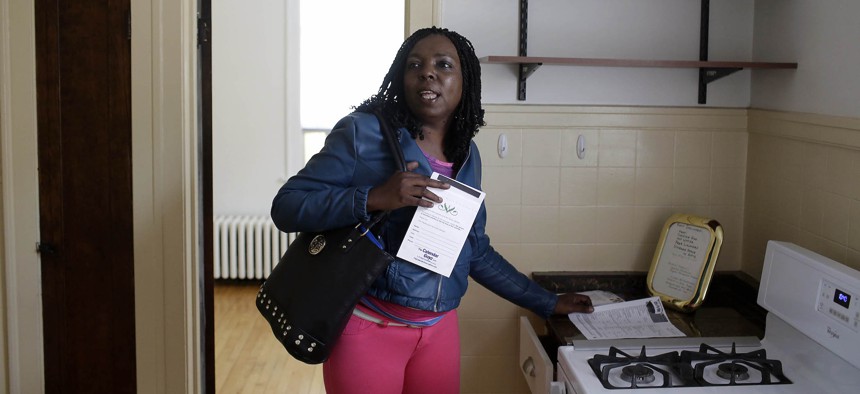Why it’s tough to stamp out housing voucher discrimination

Section 8 voucher holder Tracy Carrithers views an apartment in Chicago, Illinois. While many cities and states have laws to prevent landlords from discriminating against voucher recipients, enforcing those laws is challenging. Joshua Lott for the Washington Post via Getty Images
In many places, it's illegal for landlords to discriminate against tenants using Section 8 vouchers. Enforcing those rules is difficult, but governments are forging ahead.
Earlier this month, New York Gov. Kathy Hochul announced plans to create an enforcement unit to quickly respond to complaints about landlords rejecting potential tenants who use federal housing vouchers to cover rent. It’s the latest move in the state’s efforts to better protect households benefiting from one of the most powerful federal housing programs.
More than 2 million low-income families use Section 8 housing vouchers to cover rent. The program is one of the federal government’s most effective: It keeps more than 5 million individuals housed.
The Empire State is far from alone in recognizing voucher discrimination as a challenge. In many cities and states, it’s illegal to reject potential tenants based solely on their source of income, which includes housing vouchers. But even where laws exist to shield potential tenants from discrimination, they aren’t always effectively enforced. That allows landlords to continue to reject tenants with vouchers and makes it difficult for families to find property owners who will accept the subsidy, observers said.
It’s important to note that nationwide, all vouchers are getting used, meaning that there are enough landlords accepting vouchers, according to Will Fischer, senior director for housing policy and research at the Center on Budget and Policy Priorities. But housing voucher discrimination limits where recipients can live. A household reliant on a voucher, for example, may find the only willing landlords are in unsafe neighborhoods, or tenants may need to move into a different school district to use their voucher.
Sometimes the motive behind voucher rejections are more insidious, according to Sarah Saadian, senior vice president of public policy for the National Low Income Housing Coalition.
“There are a lot of landlords who will say that the reason why they're not renting to someone is because of the voucher when really that's a proxy for racial discrimination or discrimination on the basis of disability,” she said.
Seventeen states and dozens of cities and counties ban source-of-income discrimination. Nearly 60% of renters are protected by source-of-income anti-discrimination laws—up from 34% in 2018, according to the Poverty and Race Research Action Council. But while cities and states are increasingly passing laws to prevent discrimination, enforcement is lacking in many areas.
Take, for example, Milwaukee County, where a 2018 ban on Section 8 discrimination made it illegal for landlords to reject potential tenants who use federal housing vouchers to cover rent. But more than five years later, the discrimination is still a challenge for voucher recipients to overcome, according to Wisconsin Watch, a nonprofit investigative news outlet. In some cases, landlords even include “Section 8 housing assistance not accepted” in the listing description, but the local housing agency has never received a verified complaint.
When complaints are filed, it can take a long time for the issue to be resolved, and plaintiffs continue to struggle to find housing in the meantime, said Phil Tegeler, executive director of the Poverty and Race Research Action Council.
“The unit is long gone by the time the case is investigated,” he said. That’s one of the issues Hochul’s enforcement unit aims to address: to help tenants find relief while waiting on a hearing or settlement.
Unfortunately, most governments take a passive approach to enforcement, meaning they wait for voucher recipients to file a complaint about suspected discrimination rather than actively seeking out landlords violating the law, Tegeler said.
Part of the problem with this strategy is that it’s difficult for renters to know if their applications were rejected because of unlawful discrimination or for legitimate reasons.
This underscores the importance of tenant organizing, said Dave Pringle, director of state and local engagement for the Poverty and Race Research Action Council. He pointed to Kansas City, Missouri, where just last week the city approved a source-of-income discrimination law. Mayor Quinton Lucas and his administration worked with a citywide tenant union to craft the policy, which includes prohibitions on language like “no Section 8” in rental advertisements and the creation of a landlord liaison position at City Hall. The legislation also requires the city to proactively analyze rental ads for discriminatory language.
On the flip side, it’s critical that landlords and property owners have a good understanding of state and local laws as well. In addition to allocating $1 million to help landlords cover costs associated with accepting housing vouchers, the new Kansas City law calls for notifying tenants and landlords alike of the new rules.
“We see the best systems for enforcement include really well-publicized outreach to property owners and the real estate community,” Tegeler said.
But perhaps the most powerful method of enforcement involves “testing,” in which government agencies typically submit two very similar rental applications to a property owner, with one application including a housing voucher and the other without. These kinds of audits can help officials determine who is violating the law and bring enforcement actions against those property owners, Tegeler said.
“Publicizing those results and getting public judgments,” is also important to show other property owners that the city or state is serious about voucher discrimination bans, he added.
But conducting these audits requires investment.
“Funding for housing discrimination work comes primarily from the Department of Housing and Urban Development, which doesn't give [agencies] money to do sources-of-income discrimination investigations,” Tegeler said. “So it's really up to the state legislature to fund the state human rights agencies adequately.”






